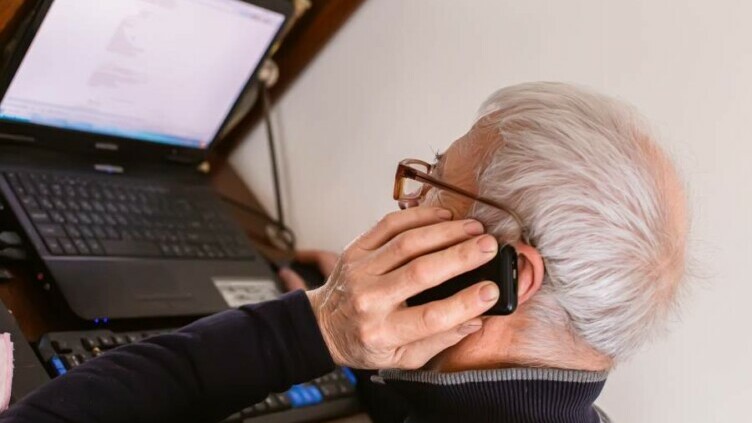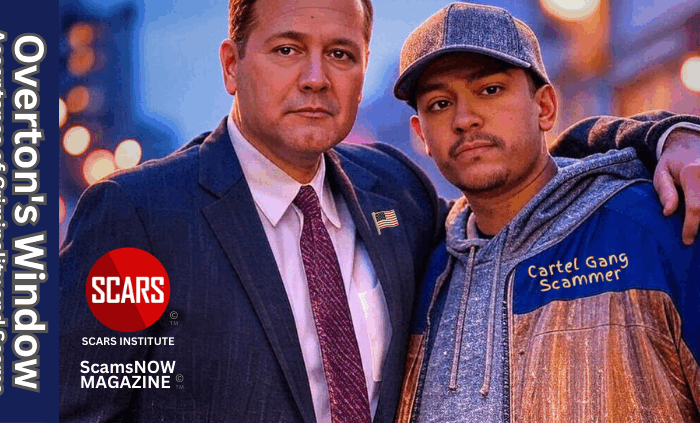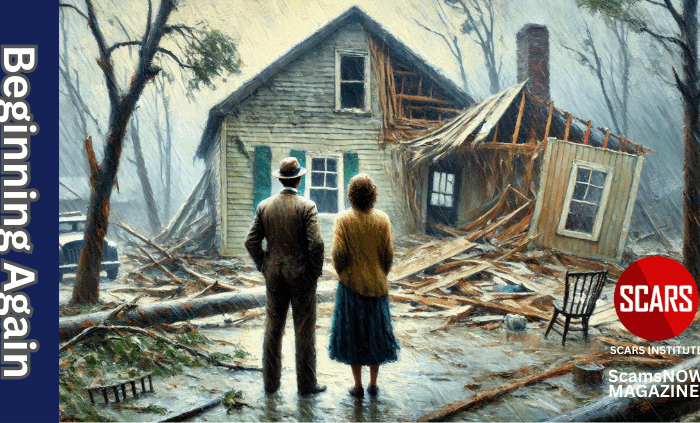Taol – Native American Talking Circles – A Perfect Recovery Model For Scam Victims
By Tim McGuinness, Ph.D. – Anthropologist, Scientist, Director of the Society of Citizens Against Relationship Scams Inc.
Taol – The Native American Talking Circle And How We Apply It In Your Recovery!
Taol – A reprint from a Native People’s Conferrence
“Taol, or traditional talking circles, is a traditional Native American practice that SCARS uses to help traumatized crime victims recover,” according to what I presented in a recent conference.
“Taol is a safe space where victims can share their stories with others who have been through similar experiences. This can help victims to feel less alone and to begin to heal from their trauma.”
Taol can also help victims to make sense of their experiences and to develop coping mechanisms. In a Taol circle, victims are encouraged to talk about their feelings, to ask questions, and to receive support from others. This can help victims to feel more in control of their lives and to begin to move forward.
There is some research that suggests that Taol can be an effective intervention for traumatized crime victims. For example, one study found that Taol participants reported significantly lower levels of PTSD symptoms and anxiety than a control group of victims who did not participate in Taol.
Native American Talking Circles
Native American Talking Circles (Taol,) also known as healing circles or support circles, can be a valuable tool in the recovery of traumatized crime victims. Talking Circles are a traditional practice in many Indigenous cultures, including various Native American First Nations. They provide a safe and supportive environment for individuals to share their experiences, express their emotions, and find healing within a community setting.
Talking Circles or Circle Talks are a foundational approach to First Nations pedagogy-in-action since they provide a model for an educational activity that encourages dialogue, respect, the co-creation of learning content, and social discourse.
The nuance of subtle energy created from using this respectful approach to talking with others provides a sense of communion and interconnectedness that is not often present in the common methods of communicating in the Native American classroom and that is typically missing from Western models of education.
When everyone has their turn to speak, when all voices are heard in a respectful and attentive way, the learning atmosphere becomes a rich source of information, identity, and interaction.
Talking Circles originated with First Nations leaders – the process was used to ensure that all leaders in the tribal council were heard and that those who were speaking were not interrupted except to enhance understanding.
Usually, the Chief would initiate the conversation, with other members responding and sharing their perceptions and opinions of the topic under discussion. The process provides an excellent model for interaction within the learning environment as well. It is also very adaptive to any circle of people who need to discuss topics and make decisions together.
Taol vs. Peer-to-Peer Support Group Models
Taol and peer-to-peer support groups are both types of group support that can be helpful for crime victims. Both Taol and peer-to-peer support groups provide a safe space where victims can share their stories with others who have been through similar experiences. This can help victims to feel less alone and to begin to heal from their trauma.
In Taol, the circle is led by a facilitator (a kind of chieftain) who helps to keep the discussion flowing and ensures that everyone has a chance to speak. In peer-to-peer support groups, the group is typically led by a therapist or other mental health professional, though it can also be led by a group leader.
Both Taol and peer-to-peer support groups can be helpful for crime victims, but there are some key differences between the two approaches. Taol is a more traditional approach that is rooted in Native American culture of inclusivity, as opposed to the Western model of competition and comparisons. Peer-to-peer support groups are more Westernized and typically use a more structured approach to support.
Ultimately, the best approach for a crime victim will depend on their individual needs and preferences. Some victims may prefer the more traditional setting of a Taol circle (which can be done online in the form of a Zoom call or in person,) while others may prefer the more structured setting of a peer-to-peer support group. While SCARS has not talked about this previously, it employs the Taol model for its support groups for maximum effectiveness.
Why Does Taol Work For Scam Victims
There are a few reasons why Taol – Native American Talking Circles can be very helpful for traumatized scam victims.
- Safety and Validation: Taol circles provide a safe space for victims to share their stories without fear of judgment or criticism. This can be especially important for scam victims, who may feel ashamed or embarrassed about being defrauded. In a Taol circle, victims can hear from others who have been through similar experiences and receive validation for their feelings, be educated, and be guided by a Trial Elder (the Taol Leader.)
- Connection: Taol circles allow victims to connect with others who have been through similar experiences. This can help victims to feel less alone and to learn from others’ experiences. It can also provide victims with a sense of community and support. More than just community, it provides very real personal connections essential to stay on the path to recovery.
- Healing: Taol circles can help victims to heal from their trauma. By sharing their stories and receiving support from others, victims can begin to make sense of their experiences and develop coping mechanisms. This can help them to move on from their trauma and to rebuild their lives. Especially true when coupled with professional trauma counseling or therapy – which SCARS always recommends.
Here are some of the psychological benefits of Taol – Talking Circles for traumatized scam victims:
- Reduced isolation: Scam victims often feel isolated and alone after being scammed. Taol circles can provide a safe space for victims to connect with others who have been through similar experiences. This can help victims to feel less alone and to know that they are not the only ones who have been scammed.
- Increased self-esteem: Scam victims often feel ashamed or embarrassed about being scammed. Taol circles can help victims to rebuild their self-esteem by providing them with a supportive and validating environment. In a Taol circle, victims can hear from others who have been through similar experiences and receive support and encouragement.
- Improved coping skills: Taol circles can help victims to develop coping skills for dealing with the psychological effects of being scammed. In a Taol circle, victims can learn from others’ experiences and receive support and guidance in developing healthy coping mechanisms.
- Increased resilience: Taol circles can help victims to develop resilience in the face of future challenges. By sharing their stories and receiving support from others, victims can learn to bounce back from adversity and to build a stronger sense of self.
Summary
If you are a scam victim who is struggling to cope with the psychological effects of being scammed, SCARS implementation of Taol – Talking Circles may be a helpful resource you need.
You can find more information about SCARS support groups or sign up at support.AgainstScams.org
-/ 30 /-
What do you think about this?
Please share your thoughts in a comment below!
More ScamsNOW.com Articles
-/ 30 /-
What do you think about this?
Please share your thoughts in a comment above!
SCARS LINKS: AgainstScams.org RomanceScamsNOW.com ContraEstafas.org ScammerPhotos.com Anyscam.com ScamsNOW.com
reporting.AgainstScams.org support.AgainstScams.org membership.AgainstScams.org donate.AgainstScams.org shop.AgainstScams.org
youtube.AgainstScams.org linkedin.AgainstScams.org facebook.AgainstScams.org
ARTICLE RATING
TABLE OF CONTENTS
- Taol – The Native American Talking Circle And How We Apply It In Your Recovery!
- Native American Talking Circles
- Taol vs. Peer-to-Peer Support Group Models
- Why Does Taol Work For Scam Victims
- Summary
- Important Information for New Scam Victims
- Statement About Victim Blaming
- SCARS INSTITUTE RESOURCES:
- Psychology Disclaimer:
- More ScamsNOW.com Articles
- A Question of Trust
- SCARS Institute™ ScamsNOW Magazine
Society of Citizens Against Relationship Scams Inc. [SCARS]
META
CATEGORIES
MOST POPULAR COMMENTED ARTICLES
POPULAR ARTICLES
U.S. & Canada Suicide Lifeline 988
![NavyLogo@4x-81[1]](https://scamsnow.com/wp-content/uploads/2025/04/NavyLogo@4x-811.png)
WHAT PEOPLE ARE TALKING ABOUT
LATEST SITE COMMENTS
See Comments for this Article at the Bottom of the Page
on Vulnerability to Scams Caused by Past Relationships is Like a River Running through Your Life Cutting Channels – 2025: “My big take away from this article is that there are many layers to my vulnerability. Yes, losing my Mom…” May 8, 11:43
on Hate for Scammers and Criminals Feels So Good But is So Bad for Scam Victims – 2025: “As stated here it feels like it should be justified – to hate them. I never did feel that way,…” May 6, 17:32
on Scam Victims Suppressing Trauma Or Avoiding Recovery And Healing 2024: “This is a great article that will, hopefully, help when I am avoiding facing my emotions/triggers. Recognizing the signs and…” May 6, 16:47
on SCARS 5 Coping Techniques For Traumatized Scam Victims – 2023: “One of the best ways of coping for me has been to reconnect with my friends. I self-isolated for months…” May 6, 16:07
on Trauma Recollection/Traumatic Flashbacks And Scam Victim PTSD – Recovery Psychology – 2023: “I don’t feel like my trauma can be described as PTSD. The affects after the scam ended were severe anxiety,…” May 6, 15:55
on Selective Amnesia and Scam Victim Psychological Trauma 2023: “This was a very interesting article to me. I have not experienced selective amnesia in relation to the scam. However,…” May 6, 15:39
on Psychological Triggers/Emotional Triggers – What They Are And How They Work – 2023/2024: “Not long after my scam ended, I needed to go to the grocery store. It never crossed my mind that…” May 6, 14:48
on Learning And The Challenges That A Scam Victim Faces From Trauma And Related Cognitive Effects – 2024: “My cognitive impairment was bad right after my scam. However, I have now noticed that it was especially bad during…” May 6, 14:23
on Hate for Scammers and Criminals Feels So Good But is So Bad for Scam Victims – 2025: “This is all true and valid. I had to forgive myself first for trusting my abuser because he hurt my…” May 6, 10:08
on Nirvana and the Path to Letting Go of Suffering – 2025: “En mi experiencia podría describir el nirvana en mi recuperación como ese estado de paz profunda y liberación emocional que…” May 5, 18:58
on The Prodigal Son or Daughter – Returning ‘Home’ After the Scam – 2025: “It’s true that the judgment of others does not define my path but if after “coming home” those closest to…” May 5, 13:21
on Beginning Again and Scam Victim Recovery -2025: “Taking action is the first step to recovery and I am doing that and becoming a newer stronger version of…” May 5, 09:53
on Beginning Again and Scam Victim Recovery -2025: “In order not to let this deception define me, since its discovery I have been ACTING.” May 5, 07:22
on The Butterfly Effect And Scam Victims – 2024: “Very good and interesting analogy to the Butterfly Effect and how it pertains to scams. In my crime I can…” May 4, 14:51
on Faith And Why It Matters In Scam Victim Recovery – 2024: “This is a good article giving examples of the difference between faith in oneself and one’s core values – to…” May 4, 13:37
on Reclaiming Your Worth: A Scam Survivor’s Guide to Navigating Your Worthiness After a Scam – 2023: “As an individual I process my emotions slowly whether it is shock, trauma, anger, disbelief. In the cycle of recovery…” May 4, 12:54
on The Stain that Never Goes Away After a Romance Scam for Scam Victims – 2025: “Thank you for sharing this important step on recovery” May 4, 12:09
on Metanoia – The Transformation for Traumatized Scam Victims – 2025: “Excelente articulo!!!… Después de superar la estafa podría describir la metanoia en mi propia experiancia como un renacimiento interior, una…” May 4, 00:24
on Philosophy of Life Planning – From Chaos to Order and the Scam Victim Recovery Path Forward – 2025: “Seeking justice is, unfortunately, not justice. Anger and revenge is not justice either. Recovery is justice. The only justice for…” May 3, 21:16
Important Information for New Scam Victims
Please visit www.ScamVictimsSupport.org – a SCARS Website for New Scam Victims & Sextortion Victims
SCARS Institute now offers a free recovery program at www.SCARSeducation.org
Please visit www.ScamPsychology.org – to more fully understand the psychological concepts involved in scams and scam victim recovery
If you are looking for local trauma counselors, please visit counseling.AgainstScams.org
If you need to speak with someone now, you can dial 988 or find phone numbers for crisis hotlines all around the world here: www.opencounseling.com/suicide-hotlines
Statement About Victim Blaming
Some of our articles discuss various aspects of victims. This is both about better understanding victims (the science of victimology) and their behaviors and psychology. This helps us to educate victims/survivors about why these crimes happened and not to blame themselves, better develop recovery programs, and help victims avoid scams in the future. At times, this may sound like blaming the victim, but it does not blame scam victims; we are simply explaining the hows and whys of the experience victims have.
These articles, about the Psychology of Scams or Victim Psychology – meaning that all humans have psychological or cognitive characteristics in common that can either be exploited or work against us – help us all to understand the unique challenges victims face before, during, and after scams, fraud, or cybercrimes. These sometimes talk about some of the vulnerabilities the scammers exploit. Victims rarely have control of them or are even aware of them, until something like a scam happens, and then they can learn how their mind works and how to overcome these mechanisms.
Articles like these help victims and others understand these processes and how to help prevent them from being exploited again or to help them recover more easily by understanding their post-scam behaviors. Learn more about the Psychology of Scams at www.ScamPsychology.org
SCARS INSTITUTE RESOURCES:
IF YOU HAVE BEEN VICTIMIZED BY A SCAM OR CYBERCRIME
♦ If you are a victim of scams, go to www.ScamVictimsSupport.org for real knowledge and help
♦ Enroll in SCARS Scam Survivor’s School now at www.SCARSeducation.org
♦ To report criminals, visit https://reporting.AgainstScams.org – we will NEVER give your data to money recovery companies like some do!
♦ Sign up for our free support & recovery help by https://support.AgainstScams.org
♦ Join our WhatsApp Chat Group at: https://chat.whatsapp.com/BPDSYlkdHBbDBg8gfTGb02
♦ Follow us on X: https://x.com/RomanceScamsNow
♦ Follow us and find our podcasts, webinars, and helpful videos on YouTube: https://www.youtube.com/@RomancescamsNowcom
♦ SCARS Institute Songs for Victim-Survivors: https://www.youtube.com/playlist…
♦ See SCARS Institute Scam Victim Self-Help Books at https://shop.AgainstScams.org
♦ Learn about the Psychology of Scams at www.ScamPsychology.org
♦ Dig deeper into the reality of scams, fraud, and cybercrime at www.ScamsNOW.com and www.RomanceScamsNOW.com
♦ Scam Survivor’s Stories: www.ScamSurvivorStories.org
♦ For Scam Victim Advocates visit www.ScamVictimsAdvocates.org
♦ See more scammer photos on www.ScammerPhotos.com
You can also find the SCARS Institute on Facebook, Instagram, X, LinkedIn, and TruthSocial
Psychology Disclaimer:
All articles about psychology and the human brain on this website are for information & education only
The information provided in this and other SCARS articles are intended for educational and self-help purposes only and should not be construed as a substitute for professional therapy or counseling.
Note about Mindfulness: Mindfulness practices have the potential to create psychological distress for some individuals. Please consult a mental health professional or experienced meditation instructor for guidance should you encounter difficulties.
While any self-help techniques outlined herein may be beneficial for scam victims seeking to recover from their experience and move towards recovery, it is important to consult with a qualified mental health professional before initiating any course of action. Each individual’s experience and needs are unique, and what works for one person may not be suitable for another.
Additionally, any approach may not be appropriate for individuals with certain pre-existing mental health conditions or trauma histories. It is advisable to seek guidance from a licensed therapist or counselor who can provide personalized support, guidance, and treatment tailored to your specific needs.
If you are experiencing significant distress or emotional difficulties related to a scam or other traumatic event, please consult your doctor or mental health provider for appropriate care and support.
Also read our SCARS Institute Statement about Professional Care for Scam Victims – click here
If you are in crisis, feeling desperate, or in despair, please call 988 or your local crisis hotline.
More ScamsNOW.com Articles
A Question of Trust
At the SCARS Institute, we invite you to do your own research on the topics we speak about and publish. Our team investigates the subject being discussed, especially when it comes to understanding the scam victims-survivors’ experience. You can do Google searches, but in many cases, you will have to wade through scientific papers and studies. However, remember that biases and perspectives matter and influence the outcome. Regardless, we encourage you to explore these topics as thoroughly as you can for your own awareness.


![2,700 Scam Slaves Rescued In The Philippines [VIDEO] - on ScamsNOW.com](https://scamsnow.com/wp-content/uploads/2023/06/wirestory_de16f11954700ffd432377267f571892_16x9_16001-1024x576.jpg)












![scars-institute[1]](https://scamsnow.com/wp-content/uploads/2025/04/scars-institute1.png)
![niprc1.png1_-150×1501-1[1]](https://scamsnow.com/wp-content/uploads/2025/04/niprc1.png1_-150x1501-11.webp)
